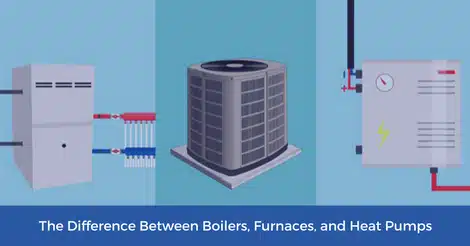
LEARN THE BENEFITS OF YOUR HOME'S FURNACE, BOILER OR HEAT PUMP
With Winter fast approaching (we've even seen snow in The DMV!), it's always a good idea to check the heating system of your home to ensure it's in great working condition for the upcoming cold season. It's also important to know not only what type of heating system you have, Furnace, Boiler or Heat Pump, and also how the system works to heat your home.
Vito Services explains the differences of the three typical heating systems in and around Rockville, Maryland:
- Furnace
- Boiler
- Heat Pump

FURNACES
Furnace: Furnaces are the predominant heat source of most single-family homes in Maryland and Northern Virginia. A furnace, which can operate using natural gas, propane, oil or electricity, creates heat through combustion. The furnace uses a heat exchanger to heat air that is circulated throughout your home's ductwork.
THE MAIN BENEFITS OF FURNACE HEATING:
- Less Expensive Initial Cost Vs. Other Heating Options
- Faster, Easily Controlled Heating
- Multiple Fuel Sources
- Energy Efficiency
How Long Do Furnaces Last?
An average furnace last an average of 15-18 years, with some lasting longer with proper yearly maintenance.
How Often Should You Service Your Furnace?
Furnaces need to be maintained at least once a year before heating season.
BOILERS
Boilers remain the predominant heat source throughout most of Washington, DC. Boilers operate by heating water within a tank using either gas, oil or coal. Either the steam or heated water then flows through pipes to radiators or baseboard heaters, which then distribute the heat that warms your home.
THE MAIN BENEFITS OF BOILER HEATING
- Lower Maintenance
- Quieter Heating Option
- Steady Heat
- No Dust Via Ductwork Air Circulation
How Long Do Boilers Last?
A boiler's life expectancy is around 18-22 years, with many regularly maintained boiler systems lasting several years longer.
How Often Should You Service Your Boiler?
Boilers need to be serviced at least once a year, ideally before the heating season.
HEAT PUMPS
As you already probably know, heat pumps are all the rage these days because they are energy-efficient and more environmentally friendly than gas-powered furnaces. Heat pumps do not create heat, they transfer it from indoors or outdoors (depending on the mode) creating energy-efficient temperate control without burning fuel to generate heat.
Heat pumps use electricity to move heat from a cool area to a warm one, which makes the space warmer in the winter and cooler in the summer as heat naturally moves to spaces with lower temperatures. Heat pumps work best in a warmer climate (because they do not heat themselves) and can use a lot of energy in extreme cold conditions.
THE MAIN BENEFITS OF HEAT PUMP HEATING
- Cost Efficiency
- Energy Efficiency
- Low Maintenance
- Heating & Cooling
- No Fuel or Combustion
How Long Do Heat Pumps Last?
Heat pump's last an average of 10 to 15 years, putting them essentially in line with most furnaces and air conditioners.
How Often Should You Service Your Heat Pump?
A professional technician should look at your heat pump at least twice a year. If you use your heat pump as your primary source of heating and cooling year-round, it may be a good ideal to have the heat pump inspected every fall and spring.
Furnace, Boiler & Heat Pump Repair & Installation
It's important to know what type of heating system you have in your Maryland, Washington, DC or Northern Virginia home. Whether you heat your home via a gas furnace, electric heat pump or boiler, proper maintenance helps ensure potential problems are caught before they result in breakdowns and keeps your system running efficiently.
For professional heat pump services, furnace installation and boiler maintenance services, Leave it to Vito for all your HVAC Heating needs!








